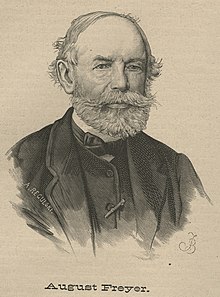|
August Freyer Karol August Freyer (15 December 1801 – 28 May 1883) was a Polish musician and composer, specializing in both performance and composition on the organ. Biography Freyer was born in Saxony in 1801.[1][2] He moved to Warsaw and began his musical career there as a double bass player.[3] He became organist at the Warsaw Evangelical Church, had the organ rebuilt, and turned his church into a prominent musical location[3] while becoming the prominent organist and organ teacher in Warsaw.[2] He made a tour of northern Germany as an organist, from which he received wide acclaim.[2] He was a musical pupil of Józef Elsner.[4] and became a close associate of Adolf Friedrich Hesse. He promoted Hesse's music to Mikhail Glinka, successful in his performance to the point of reducing his listener to tears.[5] At an early age Stanisław Moniuszko became his pupil, his parents relocated to Warsaw to have Stanisław study with Freyer.[4] He died in 1883.[6] StyleFreyer was largely responsible for the revival of organ music in Poland.[6] He was a master at music balance, both homophonic and polyphonic.[3] His playing was appreciated by Felix Mendelssohn and Louis Spohr.[3] In addition to the aforementioned German concerts, he toured Paris to an enthusiastic reception.[6] His most famous composition was a set of Concert Variations of which the final-movement fugue is the most recognized.[6] References
External links
|